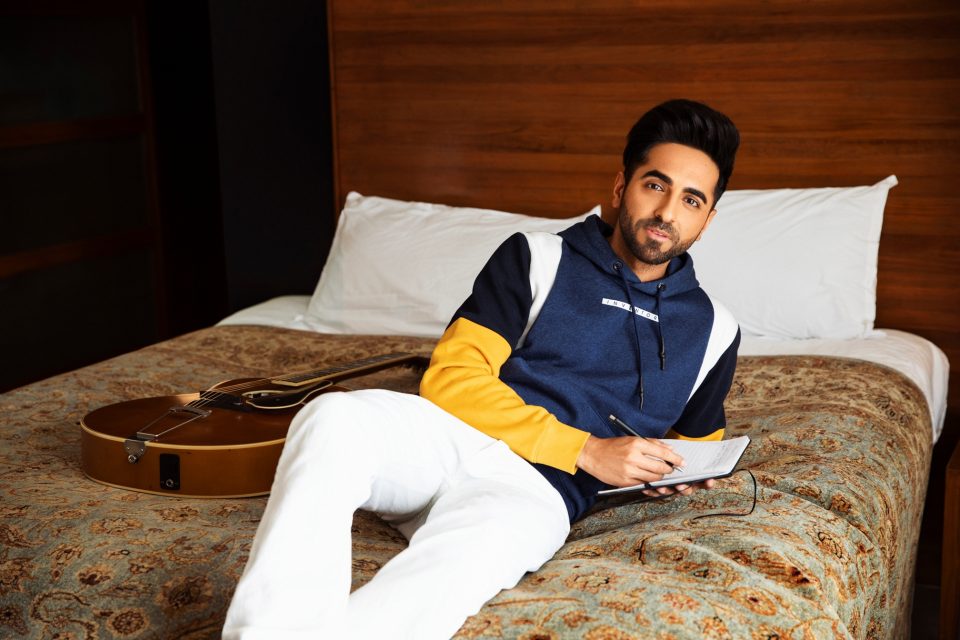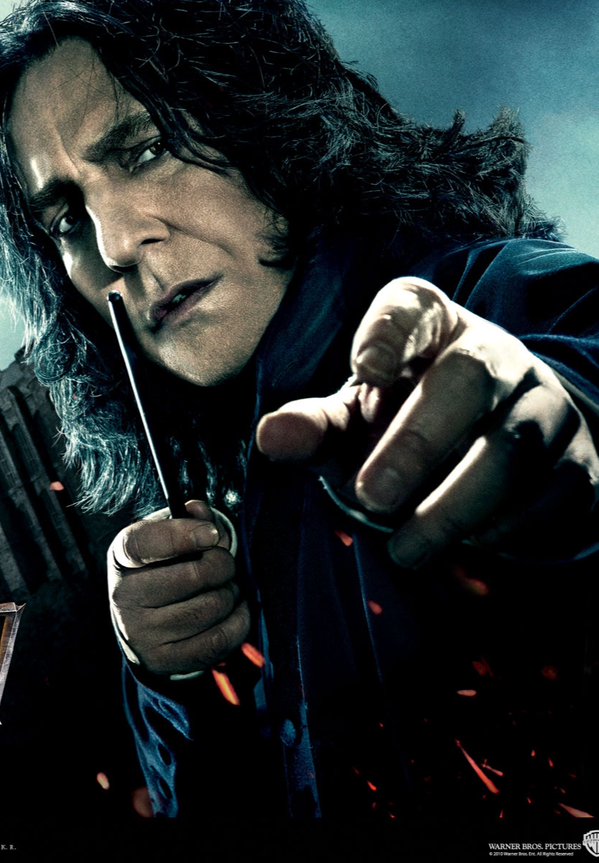COVER STORY: The Many Faces of Ayushmann Khurrana
‘Talent is overrated at times. You can’t do anything without discipline,’ says the poet, musician and actor

Color blocked hoodie and five pocket denim in snow white finish by Numero Uno; Carpet by Cocoon fine rugs; Guitar: Epiphone Masterbilt Century Deluxe. Ayushmann Khurrana photographed for Rolling Stone India by Taras Taraporvala.
On August 10th, a day after the 66th national awards were announced, Ayushmann Khurrana posted a Hindi poem on his Instagram. Written in Khurrana’s trademark luminous lyrical style, the last two lines of the verse were: uth kar gira, gir kar utha, chala, udaa/aaj unhi thokaron ki khaatir mere haq mein rashtriya puraskar hai (I have stumbled and fallen, and risen and fallen/I have walked my share and I have grown wings too/my struggles have been my biggest reward, my struggles have claimed a National Award!). The actor had just won the best actor title for his film Andhadhun.
During our chat following the cover shoot, I request Khurrana to recite the poem for us on camera. The sparkly human he is (everyone I know who has even remotely worked with vouches for his congeniality and infectious optimism), he happily obliges and gives us a rare glimpse into his poetic self. If you understand the nuances of Hindi, you’d notice that what makes the poem heartwarming is not just the generous gratitude that Khurrana has expressed but the bits about worthiness and eligibility in it which reveal his quiet confidence.

Classic trucker jacket, check shirt with trim details and light wash greenish tinted rugged denim by Numero Uno; On the wrist: Classic Cornwall Watch and Classic Bracelet by Daniel Wellington; Guitar: Epiphone Masterbilt Century Deluxe
If there were a Bollywood template to actualize all your creatives dreams in one stroke, Khurrana seems to have hacked it. Not only does he challenge the widespread belief that actors don’t make good singers, he goes ahead and shows everyone how you can be a hardworking actor and a touring musician rolled in one. There’s no one like him in the industry – which other contemporary mainstream actor do we know of who indulges in Hindi poetry, writes and co-composes songs, sings them and also has a full-fledged band that performs those originals live? He is also the only actor today to have featured as an singer/songwriter in the soundtracks of all his films released so far (Dum Laga Ke Haisha, 2015 was the only one where he didn’t).
It’s obvious that Khurrana doesn’t take success for granted and that he is not shy to switch gears when required. After an overwhelming applause for his debut film Vicky Donor in 2012, Khurrana experienced the biggest low of his career soon after when he had three straight flops in the next three years. That was when the actor decided it was about time he played to his strengths as a musician. “If you have different talents, you have to be wise enough to choose and have your own game plan,” says the singer with hits like “Paani Da Rang” and “Saadi Galli Aaja” to his name. Recently, Khurrana partnered with Facebook India to launch a unique talent hunt called Jam Sessions, inviting amateur singers, songwriters and lyricists to send in their work to stand a chance to collaborate with him. “I always wanted to do something that combines the power of social media and music… Music has always been my first love,” he says.
In this exclusive interview, we probe Khurrana the poet/singer who fell in love with acting.
How does it feel to be on the cover of Rolling Stone India?
I’m too excited! Probably doubly excited because it was on my bucket list to be on the cover of Rolling Stone and it has happened, finally!
Things are going so well for you! With two back-to-back releases (Article 15 and Dream Girl) and a precious National Award to your name, how are you feeling right now at this point of time in your career?
I feel validated that my work is getting appreciated. I’ve always wanted to do this as an actor and singer — to do my kind of films, my kind of music, although I’m not getting time for music these days. But the films that I have been doing — thanks to the scriptwriters and directors I get to work with and the characters that are made specially for me which also resonate with the audience — I think it’s amazing. Life is beautiful!
How amazing! You must feel very grateful too?
I feel really grateful. I was always there at the right place at the right time. I started doing radio in 2006, when radio was surging, and then I became a VJ [when] people were looking for a VJ. And then Vicky Donor happened. That [film] was kind of a case study for the taboo subjects that never did well in Indian cinema. So I think I’m very fortunate.

Tan pullover and Ice washed grey denim by Numero Uno; On the wrist: Classic Cornwall Watch and Classic Bracelet by Daniel Wellington; Carpet by Cocoon fine rugs.
You have served as a guinea pig of sorts; a few filmmakers test the waters with you thinking, ‘This guy will do it’ and the rest follow suit…
I don’t know about that. I just love taking risks. Thats my USP. You know you would carve your own path, [that] you would tread the territory that was untreaded till now. And that’s my space. I have created that space for myself.
Tell me about all the hard work and discipline that goes into being an actor and a musician.
Discipline, yes. You can’t do anything without discipline. Talent is overrated at times. Hard working artists overtake talented artists. I had written a line I remember: ‘Bachpan mein papa ki lagayi hui pabandiyo ko todne me bada maza aata tha/ par bade hokar khud pe lagayi hui pabandiya todi nahi jaati.’ (What fun it was to rebel against your parents as a kid/ Today, I find it tough breaking free from my own shackles) That’s the story of life itself — hard work is extremely important. But wisdom is more important, even more than intelligence. You have to be wise enough to take the right decisions.
What were the most important decisions you made and the experiences you had that got you here?
Failures, of course. You know, success is a very lousy teacher. Failure is a philosopher and guide, and you learn everything from your failures. You haven’t lived your life if you haven’t failed.
What do you consider your one big failure which brought you your biggest learning?
My three back-to-back films after Vicky Donor. They didn’t do well. You know when you strike a goal with your very first film, you feel you have that Midas touch and that anything you touch will now turn to gold. And [when] that doesn’t happen — it has to be beyond you. It is a team effort. I got my basics right eventually. You just go with the content — the material — it doesn’t depend on your co-actor, if that person is an A-lister or not. Or the stature of the director — A-lister or a big name. Anybody can write a great script sitting in the remote corner of Aaram Nagar or Chandigarh or anywhere.
But in your case, the time when you weren’t faring well as an actor, you were doing great as a musician, writing your songs and performing with the band.
You know, I’m gifted that way. I have options in life. I’m also a journalist — I have a masters in journalism. So sometimes, you just have one plan in life and that’s great. You don’t have to be multi-talented. If you have different talents, you have to be wise enough to choose and have your own game plan. A very unique story of my life was when Hawaizaada failed at the box office and I was like, ‘I need to look for plan B.’ Within four days, I formed my band. I collected the best musicians from Coke Studio — there was was Kelly aka Kalyan Barua [on guitar], Lindsay D’mello [on drums] and a few newcomers. It was a mix of musicians that were experienced and awesome. And my first concert was in Goa, at the Vfest organized by Channel V. It was my very first show and there was an audience of 10,000 people — college students from across the nation! It went pretty well — I got goosebumps. That was the time I was also rattled. I didn’t know what my future was in the industry. That was the time when I decided to have a band. Because immediately after Vicky Donor, I was like ‘I might never get to sing again. I’ll focus on acting and sing one song in a film.’ I was not travelling or touring. I had no band at the time.

Camo parka with utility pockets, black shirt and denim by Numero Uno; On the wrist: Watch by Daniel Wellington.
The feeling that you experience on the stage is something else though, right?
It’s an amazing feeling on the stage. If you have prepared with your band, you can improvise. Improvisation only happens when you have performed multiple times in that closed rehearsal room. Every performance has to be tight, smooth. You know, I have rehearsed so much as a musician over the years that I have started programming whole songs now. Earlier, Kelly used to program for me. After that, I started learning and doing it myself. It was so liberating! You know you get that kick after giving the first shot in front of the camera while acting. It’s the same feeling in music. But when my films started doing well again I thought I should not leave this. Music is a part of my identity.
Apart from your original songs, does your setlist include other tracks as well?
My setlist is a mix of my songs, some Nineties rock songs and other hits like “Meri Pant Bhi Sexy” (from the 1994 Govinda, Karisma Kapoor-starrer Dulara). We also perform a slow medley of songs like “Moh Moh Ke Dhaage” (Dum Laga Ke Haisha) seamlessly going to tracks such as “Udta Punjab” (the title track of the 2016 Shahid Kapoor hit). I have no problem singing songs sung by other artists or which featured other actors. I have no ego like that. If I love a song, I sing it!
What do you make of the independent music scene in India right now?
I think this is the best time to be an artist in India. A lot of people from back in the day say theirs was the best time, that the movies, the songs made then will always be the best. But I think this is the time. This is the best time for Indian cinema and Indian music. Earlier, there was this divide between indie music and commercial music. Now there’s something in between also. There’s a congruent area where people like Prateek Kuhad, Ankur Tewari and others are doing really well. And they are commercial too. For the first time I’m seeing English vocals doing well in our country, which is great! We had a lot of rock bands like Orange Street, Mrigya and others in the past but they were not selling, you know. There was only niche audience for those. But today, a lot of that is commercial – be it rock or hip-hop. I think as artists we just need to follow our heart and be true to our art.
Ayushmann Khurrana photographed for Rolling Stone India by Taras Taraporvala
Art Director: Tanvi Shah
Fashion Editor: Neelangana Vasudeva
Fashion Intern: Sheebani Kunde
Hair by Team Hakim’s Aalim
Makeup by Natasha Nayar
Location Courtesy: Hotel Sea Princess, Juhu, Mumbai







